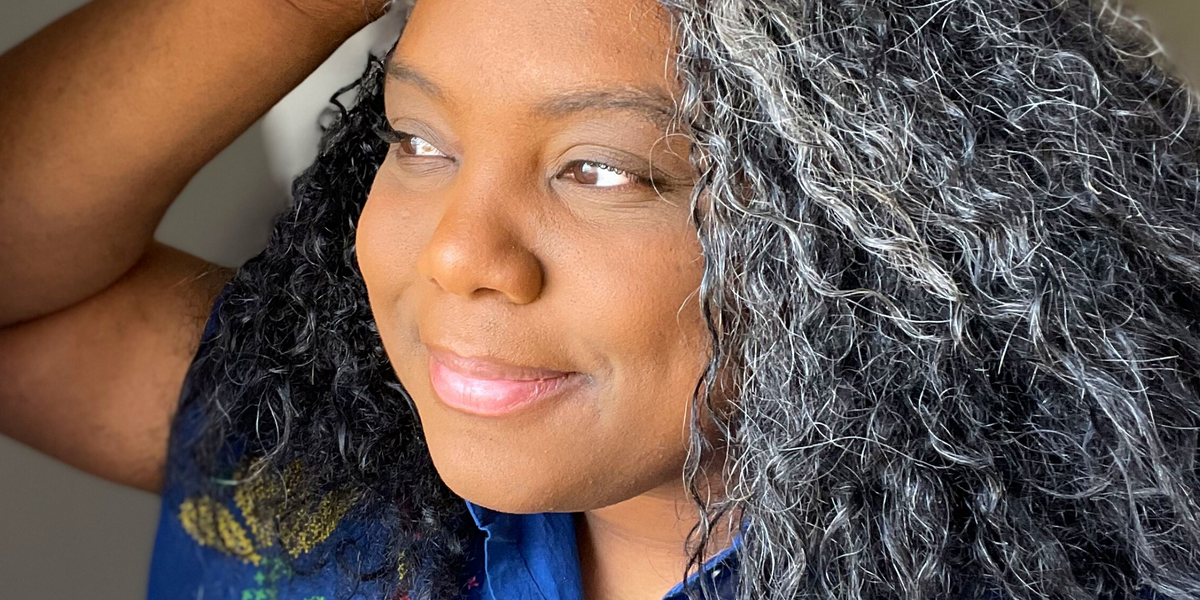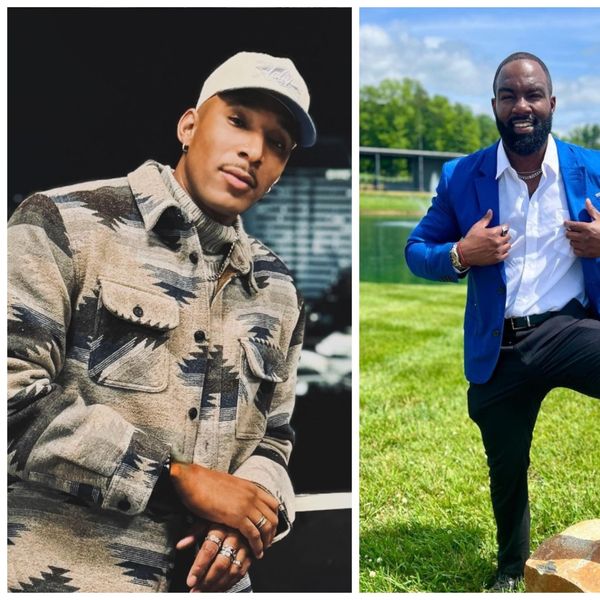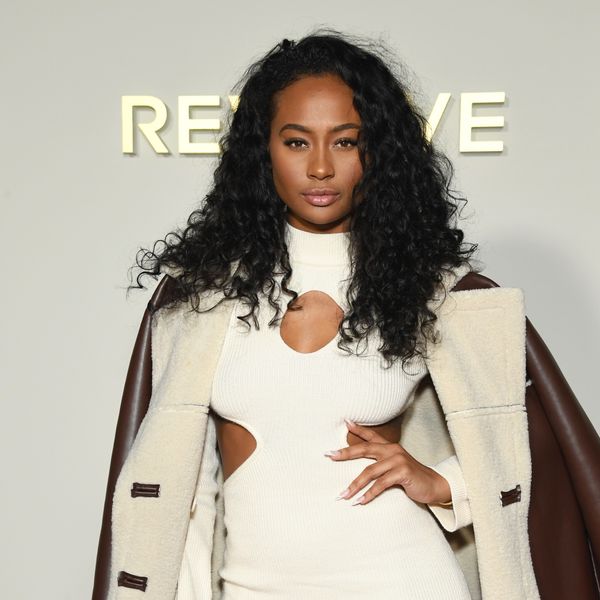
Morgan Harper Nichols Got The Clarity She Needed Through An Autism Diagnosis At 30
If you're on Instagram, you have likely come across words written by Morgan Harper Nichols and, if you have, chances are you were both moved and inspired by her words. If you haven't come across her beautiful words, trust me when I tell you that you are missing out on some gems. Artist, poet, and musician Morgan Harper Nichols has managed to cultivate a massive following on Instagram (1.7 million and counting to be exact) with her magical, soulful words. Words that seem to hit you right in the gut because it's just what you needed to hear.
I'm one of those 1.7 million followers and the one word that comes to mind whenever I see a post from Morgan is vulnerability. The kind of vulnerability that makes you want to share too. In fact, in 2017, Morgan started a project where she invited people to share their stories with her via her website. And guess what? People shared. Morgan was able to take those stories from readers all over the world and create art with her responses to the stories she received. Of course, all stories and names are kept private but the art she has been able to create from those stories is shared all over social media daily.

Morgan's supporters are not the only ones that share personal stories though. Earlier this year, Morgan shared something very personal with her followers and blog subscribers. She shared that she was officially diagnosed with autism. The average age of an autism diagnosis is around three years old, so receiving a diagnosis as an adult is not as common and more difficult as there is no established procedure for diagnosing autism in adults. On her journey to diagnosis, Morgan found just how difficult it would prove to be. She shared that she actually asked her doctor for a referral years ago after suspecting that she might be on the spectrum. Her concerns were dismissed and she was told that she had nothing to worry about. She took his word but only for a moment.
Last year, Morgan got the courage to reach out again for help and today she is so grateful that she did.
Morgan on what led her to believe she needed help:
"There were a few things, but primarily I was struggling with a lot of social and communication issues. Especially in high school and college but I just thought that I was awkward. I would miss out on social cues and even basic things like email etiquette were a struggle for me. I just kind of put it on myself and thought that I needed to grow up and stop being so awkward. But by the time I was in my late twenties and grown, I realized I was still struggling with these issues and I felt like there was just something there and I didn't know what it was.
"My parents had actually talked about autism before but it is not a diagnosis that you even considered for a lot of girls, especially back in the 90s. And more so for girls of color. And black girls, it's almost impossible. I felt tired and exhausted all of the time. Now I know that I have a lot of sensory processing issues. I didn't realize that things like loud music or bright lights wear on me throughout the day. I just thought that I was just extra tired. So, that's what led me to seek help the first time."
"By the time I was in my late twenties and grown, I realized I was still struggling with these issues and I felt like there was just something there and I didn't know what it was. My parents had actually talked about autism before but it is not a diagnosis that you even considered for a lot of girls, especially back in the 90s. And more so for girls of color. And black girls, it's almost impossible."

Courtesy of Morgan Harper Nichols
On why seeking a diagnosis was the right thing for her and her quality of life:
"I had also dealt with pretty severe depression as a teenager. I think other people who have dealt with depression can relate to this but you just kind of know when you're headed in a direction you don't want to go back in. When I was a teenager, everything was so stressful. I mean, everything from trying to make friends to trying to keep up with school. I was just so overwhelmed and that drove me to depression. I think that was a part of it too, recognizing that it was something there and not wanting to go back to that place and wanting to get help."
Morgan on what has changed since receiving her autism diagnosis:
"One of the first things that the specialist said to me right after giving me the whole rundown of the diagnosis was, 'And it's not your fault.' I cried decades of tears in that moment. It was just such a healing moment for me because I had been putting so much responsibility on myself, especially after having had a medical professional look at me and say I was fine and had nothing to worry about. Having that said to me, I felt it was my fault and that I had to fix it. So having another professional who knows this diagnosis backward and forward tell me that it wasn't my fault just changed a lot for me.
"Since then, I've made some adjustments in my day-to-day life. I realized I was putting so much responsibility on myself, even with work and not asking for help. I kept thinking that I could do it. I've gotten help with things like managing emails. It's hard though because there's a part of me that feels like I should be able to do these things on my own. There's a lot of stigma around asking for help and unfortunately, we live in a society where people don't feel like they can ask for help, even more so black women. I feel like now I finally have the language to work through that and say, 'OK Morgan, I know you feel like you should be able to do this by yourself but there are legitimate reasons why you can't.' I've got to seek help and that's new for me because I do try to take all that on my own."
"I cried decades of tears in that moment. It was just such a healing moment for me because I had been putting so much responsibility on myself, especially after having had a medical professional look at me and say I was fine and had nothing to worry about. Having another professional who knows this diagnosis backward and forward tell me that it wasn't my fault just changed a lot for me."

Courtesy of Morgan Harper Nichols
On what it was like telling those close to her about her autism:
"It was surprisingly a very loving and supportive experience and I consider that to be a huge privilege. I have a sister who was diagnosed with Tourette's Syndrome and ADHD as well. Because of that, my family at least had some kind of frame of mind on how to deal with these issues. You know, at least how to support each other through them. I only knew about autism because my mom was the one who thought something may be there but she had doctors tell her I was fine. My husband and friends were also very supportive.
"I was just surprised at how supportive people were. I think one thing that can hold people back (including myself) from wanting to share is that sometimes you may feel like you're putting a burden on other people. What I found is that people want to support you. Once you share, you're going to find that people really do care. I was even shocked at the amount of response that I got on social media. There's so much happening in the world and on social media, so I didn't know what to expect. I was just blown about by the support. If teenager-me could have seen this, she wouldn't have believed it. So grateful."
On what she would tell someone who might have a hard time advocating for themself:
"Honestly, the first thing that came to mind is something that I have honestly had to hold on to from the moment with that first doctor all the way to today and in different areas of my life, and that's that there are other people out there. And I say that for those moments where a person looks at you and says that there is nothing wrong with you, you need to stop asking about this, or you need to do this or you need to do that. Just take a deep breath and remind yourself that there are other people out there. Yes, there are people who will shut you down, but there are also other people out there who won't. It might take time to find those other people, but it is worth the pursuit."

Courtesy of Morgan Harper Nichols
Morgan on 'How Far You've Come' and what she hopes readers will gain from her book:
"The book actually started by going through my phone and looking at photos. It was the beginning of the pandemic and I was just thinking about all of the places I've been and could not get to. I ended up on this photo that I took at sunrise in New Mexico years ago. I'm a visual artist and one thing I love to do is paint over photos. So, I took the photo and I put it on my iPad and I started painting over it. When I started painting over it, I started thinking about how much I loved the photo and how beautiful it was. And when I looked at the date of this photo, it was a really hard season and a really hard time in life.
"I just started thinking about how there's probably so many moments in my life where there's two things happening at once, that I managed to notice something beautiful amidst the chaos. So, I wrote the book literally by going through my camera roll and looking at my photos and at different places on the map and finding beautiful pictures and also finding where I was growing in courage or strength even when there was so much else going on."
"I hope the book encourages you to go through your camera roll and find those photographs that show you how far you have come. My hope is that readers are able to see that with everything going on, they are still capturing beauty and able to notice where light is pouring in. I think that those two things together can teach us a lot about our journeys and help us give ourselves some credit for how far we've come."
Morgan's newest book How Far You Have Come: Musings on Beauty and Couragewill be released on April 27th and is currently available for pre-order.
Featured image courtesy of Morgan Harper Nichols
Erica Green is a Clinical Research Associate, blogger, and a sneakerhead. She has a love for all things women and she's pretty sure that women are God's greatest creation. Connect with her on Instagram @ erica_britt_ or www.lovethegspot.com
This article is sponsored by Hulu.
UnPrisonedhas returned for its highly anticipated second season, delving deeper into the complex dynamics of the Alexander family.
The series premiere comes a year after its debut season garnered rave reviews from fans and critics and earned record-breaking ratings for Hulu's Onyx Collective brand. UnPrisoned's success can be attributed to its raw, relatable themes and comedic appeal.
Inspired by creator Tracy McMillan's life, the show follows Paige (Kerry Washington), a therapist and single mother whose life takes an unexpected turn when her father, Edwin (Delroy Lindo) --who was released from prison-- moves in with her and her teenage son, Finn (Faly Rakotohavana).
Throughout UnPrisoned's first season, viewers witnessed how Edwin's incarceration deeply affected Paige's life and relationships. In the series, Paige unpacks her trauma through interactions with her inner child and her online followers. Meanwhile, Edwin is overcoming specific struggles with his own past that led to his life of crime, including a dysfunctional upbringing and his mother's arrest. As the Alexanders attempt to reconcile, new challenges arise.
This new season promises to further explore their unconventional family dynamic. Here are several compelling reasons why season two of UnPrisoned should be on everyone's watchlist.
The Alexander Family Life Is Still In Shambles
UnPrisoned's second season resumes where the series left off, with Paige grappling with the fallout from her troubled therapy practice and Edwin navigating life independently after moving out. Meanwhile, Finn faces his own challenges. The teenager is battling anxiety and seeking information about his father—a topic Paige avoids discussing.
The Alexander Family Are Attending Therapy To Resolve Their Underlying Issues
Amid the chaos in their lives, the Alexander family decides to mend their bond by confronting their past traumas. They seek professional help and attend therapy sessions with a “family radical healing coach,” played by John Stamos, a new cast member. This collective effort aims to unravel the complexities of their shared history and strengthen their relationships.
The process of unraveling each character's internal conflicts and their potential impact on future relationships may clash with Paige's textbook therapy approach. While Paige is used to being in the therapist's seat in both career and family, this forces her into the unfamiliar role of a patient during therapy sessions. This shift would compel her to look in the mirror and try a radically different approach.
The Alexander Family Learned A Big Lesson During A Therapy Session
In therapy, the Alexanders are tasked with addressing their individual traumas to salvage their remaining relationships. One of the family therapist’s eccentric suggestions was an exercise involving a family wrestling match. During this session, Paige faces tough questions about her refusal to share information about Finn's father.
While it's unclear whether this scene is reality or fantasy, the image of the family duking it out in the ring certainly makes for hilarious yet compelling television.
Paige Tries Dating Again Following Failed Relationships
Amid her life's chaos, Paige decides to step back into the dating field. However, her many attempts have left her with mixed results. The dating apps have turned out to be a fail, and an outing with her ex Mal (Marque Richardson), who is also her father's parole officer, doesn’t go quite as expected after he brings an unexpected guest – his new girlfriend.
The situation takes an awkward turn when Mal's new partner learns why the former couple split, partly due to Paige's self-sabotage.
UnPrisoned Is A Perfect Balance Of Comedy And Drama
As a dramedy, UnPrisoned takes a comedic approach to its heavy subjects. The show takes us on a ride with Paige's dating misadventures and navigating a friendship with her ex.
Other lighthearted moments include Edwin's attempts at CPR based on online videos and, of course, the antics of the Alexander family's unconventional new healing coach.
The second season of UnPrisoned is now available on Hulu.
UnPrisoned | Season 2 Trailer | Hulu
Feature image courtesy
There's nothing like a sweet, cool drink in the summer, and it's really tempting to indulge when you're focusing on your health. However, most of our favorite summer drinks contain a lot of sugar and can derail your journey to good health.
“Reducing sugar can be a breeze with a few smart swaps. Instead of sugary snacks, reach for fresh, whole fruits that are naturally sweet and brimming with vitamins. Swap sugary sodas and juices for water infused with slices of citrus or a handful of berries," say experts at Live Football Tickets.
"Pay attention to hidden sugars in packaged food by checking labels and opt for low-sugar alternatives. Preparing your own beverages like iced herbal teas sweetened with a touch of honey or fruit-infused sparkling water gives you full control over the ingredients and helps you avoid sugar overload while staying refreshed this summer.”
If you're curious to know which drinks you should avoid, check out this list of the seven worst summer drinks compiled by fitness experts at Live Football Tickets and Offbeat Marketing.
Energy Drinks
There's a reason why the UK proposed a ban on energy drinks for those who are under the age of 16. They are loaded with caffeine and taurine, which can raise your heart rate and blood pressure. Because it's a sweet drink, the taste can trick you into overconsumption, leaving you dehydrated, especially when paired with alcohol. Some of the other risks include abnormal heart rhythms, seizures, and mood swings.
Bubble Tea

SolStock/ Getty Images
This trendy drink, unfortunately, has some downsides when consumed excessively and is best avoided on your health journey. It's high in calories due to the combination of sweetened tea, milk, and tapioca pearls,and it contains 7 to 12 teaspoons of sugar. The tapioca pearls can also cause gastrointestinal issues like bloating, gas, and constipation, as well as artificial flavors, colors, and preservatives.
Sweet Cocktails
Sweet cocktails like margaritas and frozen daiquiris are very deceptive, as they can be refreshing on a hot day. However, a classic margarita can account for over 70% of your daily sugar intake. A good trick that the study suggests (and also something my dietician recommends) is drinking a glass of water for each cocktail. This helps keep you hydrated.
"Your body is mainly made up of water, so staying hydrated is essential, especially with the extra sweating that happens in the summer," says Donna Callander, personal trainer and director of Offbeat Marketing. "While everything is fine in moderation or as an occasional treat, it’s important to be mindful of the hidden calories, sugars, and salts in what you consume.”
Lemonade

F.J. Jimenez/ Getty Images
It's probably no surprise that lemonade was voted as most people's favorite summertime drink. But as popular as it is, we may forget about the sugar and acidity that it has and this blend can have negative affects on our health and teeth. It can spike blood sugar levels and erode tooth enamel, which leads to cavities.
"Your body is mainly made up of water, so staying hydrated is essential, especially with the extra sweating that happens in the summer. While everything is fine in moderation or as an occasional treat, it’s important to be mindful of the hidden calories, sugars, and salts in what you consume.”
Smoothies
I know what you're thinking: aren't smoothies healthy? They can be, but they are also often packed with sugar. The fruits and vegetables that are used in smoothies are good for you, but it's all about moderation. When fruit is blended, it breaks down its cell walls and releases natural sugars as free sugars that are quickly absorbed into the bloodstream, leading to rapid spikes in blood sugar levels.
Frozen Coffee

Phaisit/ Getty Images
I'm a sucker for a Frappuccino, but with all the whipped cream and syrups inside, it's essentially a sugar bomb. Drinking frozen coffee and Frappuccinos can lead to weight gain and possible health problems like type 2 diabetes. While the National Health Service (NHS) says adults should consume a maximum of 30g of sugar daily, some of our favorite coffee shops' drinks, like a Starbucks Caramel Frappuccino with semi-skimmed milk, have a staggering 48.5g of sugar.
Soda
The high sugar and caffeine in sodas can lead to dehydration, which is the last thing you want on a hot summer day. A typical can have around 39g of sugar, which is about nine teaspoons, and this excess sugar forces your kidneys to work harder to process it, leading to increased urination and subsequent fluid loss. If you're craving a fizzy drink, try unsweetened sparkling water instead. Unsweetened sparkling water and fruit-infused water help improve digestion and constipation.
Let’s make things inbox official! Sign up for the xoNecole newsletter for love, wellness, career, and exclusive content delivered straight to your inbox.
Feature image by Westend61/ Getty Images









